There are lots of mega sign-up bonuses on credit cards nowadays. Many of us won’t even consider applying for a card unless it has at least a 50,000 point sign-up bonus.
Then on the other end of the spectrum you have credit card sign-up bonuses that are so bad that they’re comical.
For example, in April I wrote about the sign-up bonus being offered by the Japan Airlines Mastercard, whereby they were offering a stuffed animal as a sign-up bonus… but only for the first 100 approved applicants!
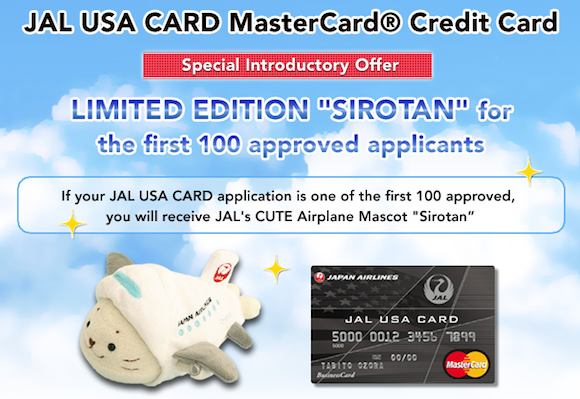
In terms of equally amusing sign-up bonuses and promotions, ANA sent out an email to all Mileage Club members in the US today about their “Double Shopping Mile Campaign.”
When you make a purchase during the month of October, you earn double miles through their shopping mile campaign. So where can you shop and earn double miles? Well, only on ANA flights booked through the ANA website.
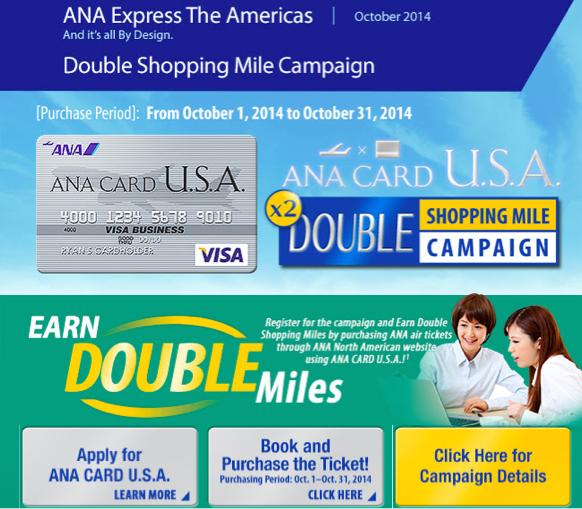
Yup, so their big promotion is that they’re offering double miles for the month of October for flights booked through their website, assuming you pay with your ANA Visa. Meanwhile virtually every other airline offers (at least) double miles when you use their credit card on airfare, regardless of the month.
If you don’t have the card yet, worry not. You can earn 5,000 bonus miles “only once” after your first purchase.

I do love how the top of the email says “And it’s all By Design.” What, exactly, is by design?! How bad the offers are?

And what exactly are these ladies so excited about? Are they booking their tickets on ANA to Kanamara Matsuri?

Bottom line
I totally get why some airlines don’t have co-branded credit cards in the US. A lot of airlines take the “if you can’t do it right, don’t do it at all” approach. For example, Singapore Airlines doesn’t have a co-branded credit card in the US.
But the marketing of the ANA and JAL credit cards in the US is fascinating. Clearly they don’t have a grasp on how the market works, yet they’ve invested enough to actually offer the product.
Something is lost in translation here…


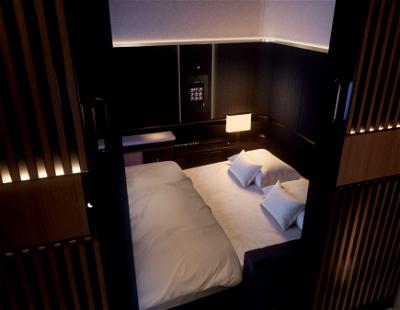
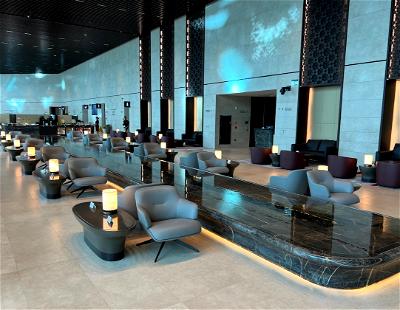
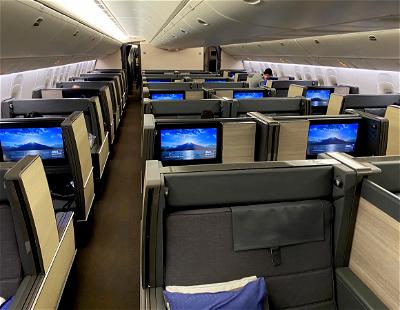
On a given flight itself, the only major difference between classes on domestic and International Japanese airlines is the space. Provided they're not offensive, people get treated with respect and decorum wherever they sit, manners usually reciprocated by (Japanese) passengers. The culture has a greater sense of equality.
On American airlines (not AA), the class in which you sit dictates how badly you don't want to be treated. Essentially, air miles equate to feeling...
On a given flight itself, the only major difference between classes on domestic and International Japanese airlines is the space. Provided they're not offensive, people get treated with respect and decorum wherever they sit, manners usually reciprocated by (Japanese) passengers. The culture has a greater sense of equality.
On American airlines (not AA), the class in which you sit dictates how badly you don't want to be treated. Essentially, air miles equate to feeling superior and escaping a substandard experience. Keep your air miles, you need them!
All that said, noticed how countries that offer the best air 'miles' aren't metric?
When I moved to the US, virtually no banks would issue me a credit card. I called ANA and they extended me a credit line of $2,000. I built my credit history with them. Although I canceled the account shortly after I was approved for a Citi credit card account, I am grateful of ANA for looking up my credit history in Japan and issued me a credit card.
Horrific cards, terms and bonuses in Japan. Par for the course here but the real ineptitude is when they carry over these policies to other countries. No wonder Japan is circling the bowl. Very indicative of general Japanese culture and business sense.
(Follow-up: I figured out why I didn't know this: there's no convenient way to get from an ANA destination city to my city in the US using airline miles alone. At least, that's what the United online flight reservation tells me.)
Woah, I can buy ANA flights with United miles? Finding this blog must be the best thing I did today.
@ Avery -- Yep, you sure can!
I have wondered about why ANA offers their card in the U.S., when its not really worth the extra credit pull. Just simple arbitrage, I could get a Chase Freedom card and the equivalent of 20,000 miles on United (which gets me availability on ANA) with no meaningful spend or annual fee. And that is not really trying.
Perhaps ANA just wants to show it is trying in a sense. In my experience dealing with...
I have wondered about why ANA offers their card in the U.S., when its not really worth the extra credit pull. Just simple arbitrage, I could get a Chase Freedom card and the equivalent of 20,000 miles on United (which gets me availability on ANA) with no meaningful spend or annual fee. And that is not really trying.
Perhaps ANA just wants to show it is trying in a sense. In my experience dealing with Japanese financial institutions, having a presence in the market is often considered very important as a matter of relationship management, and is not necessarily driven by profit motive.
I am baffled by all the uproar and conversation about this post. Bottom line on this is why are they bothering to send out the offers when they simply have no ability to land the accounts? The waste of time and money to send these offers can't be justified here in the US when competing against US card offers. Their offers might be or might not be valid in Japan or other countries, but they just aren't competitive here so why target US consumers?
@Adam - Do you always refer to Japanese people as "Japs"? What do you call blacks and Hispanics?
@Matteo - if that was the case, then why dont EU countries have the best and biggest signup bonuses of all times? considering EU folks (esp French & Brits) on avg take the longest vacations out of all peoples incld Americans.
because there's a lot more to the story here and why the US CC market is the way it is. it didnt used to be like that at all. some could say these are...
@Matteo - if that was the case, then why dont EU countries have the best and biggest signup bonuses of all times? considering EU folks (esp French & Brits) on avg take the longest vacations out of all peoples incld Americans.
because there's a lot more to the story here and why the US CC market is the way it is. it didnt used to be like that at all. some could say these are the pioneering days and will only spread to the rest of the world as many 'American habits/dreams' do.
but first things first: yes CC signup offers and bonuses are horrible in Asia. ask anyone living in SIN that tries to rack up any significant amount of SQ miles - they cant, atleast not like we can in the US. so agreed with Greg that these Jap CCs are most likely targeting Jap nationals who are used to Jap CC offers and now reside in the US, to either earn their continued business or help em establish credit histories in the US. without which these folks wouldn't have access to the mega US offers anyways.
anyways coming back to the point of why CC offers are so lucrative in the US? I believe one of the biggest reasons are what has happened in the US economy over the last 40 yrs or so -- fundamental shifts. in the 1970s real wages stopped growing and became more or less stagnant/constant, yes taking inflation into account. however, Americans were used to a certain lifestyle or standard of living because prior to that wages had grown consistently for 150 years since records were kept by BLS (1820-1970) as productivity of the avg American employee grew. however, due to various influences and reasons, wages stopped growing. it used to be that you had to be really rich to even have a CC, not everyone had one like these days. not everyone was meant to have one or even a credit line, only the rich or businessmen who needed LoCs for their business.
but banksters among other risk management professionals figured out the growing demand in a way for keeping up with the joneses, however without the lack of sufficient income. people still wanted the prev lifestyle they were used to even though their real buying power decreased or didnt grow with every 'promotion' and so the influx of credit appeared. precisely so that you could maintain your living standard with the huge diff being, this was borrowed money rather than money that would previously have been part of your income. Americans bought into it, they were happy enough and kept buying and buying on credit. those who were savvy consumers could game the system, those not so educated would fall victim to the dangerous world that lies just beneath the surface of juicy offers.
after the financial collapse of 2008 which basically signaled that Americans were upto their eyeballs in debt and just couldn't borrow anymore to keep the circle going, mega bonuses started to appear to entice consumers into guess what: signing up for even more credit. the rat race continues, there are pitfalls to be careful of, not to mention the ever moving 'goal post' and sometimes the unattainable carrot tied at the end of the stick. but alas, if you wanna know more about what's actually going on with the American socio-economic market, take a couple hours out and watch this: https://www.youtube.com/watch?v=TZU3wfjtIJY
I've been living in Japan for a couple of years now and I'll have to agree that for the most part, cc sign-up bonuses and point-earning potentials are pumpkin. But I did come across a few credit cards that do offer full Priority Pass membership (including access to US Airways and UA lounges) for ~$100 USD annual fees:
http://mileageawards.blogspot.com/2014/02/japanese-credits-cards-with-priority.html
So there are still deals out there, just harder to find and even harder...
I've been living in Japan for a couple of years now and I'll have to agree that for the most part, cc sign-up bonuses and point-earning potentials are pumpkin. But I did come across a few credit cards that do offer full Priority Pass membership (including access to US Airways and UA lounges) for ~$100 USD annual fees:
http://mileageawards.blogspot.com/2014/02/japanese-credits-cards-with-priority.html
So there are still deals out there, just harder to find and even harder to get qualified for since cc's in Japan generally have lower approval rates than U.S. cc's.
The percentage of commenters spewing drivel from atop their soapbox seems to have increased exponentially in the past few months. Most of us come to this blog because we enjoy the hobby, and enjoy finding any tidbit about it that we can. It used to be valuable to peruse the comments section, now it seems to be infested with a bunch of posters hell bent on proving how important they are, in an attempt to...
The percentage of commenters spewing drivel from atop their soapbox seems to have increased exponentially in the past few months. Most of us come to this blog because we enjoy the hobby, and enjoy finding any tidbit about it that we can. It used to be valuable to peruse the comments section, now it seems to be infested with a bunch of posters hell bent on proving how important they are, in an attempt to hide from their own insecurity.
Question to those commenters.... don't you all have something better to do? My guess?... No.
...and yes I understand the irony of my post.
You miss a lot of what happens behind the scenes.
Risk management is a part of any credit card's strategy (as in defaults, etc). So a card issuer and partner may not want broad appeal at all and keep the book small.
A product can be quite successful for the company and partner by targeting a very specific niche. In this case it could very well be Japanese nationals who now reside in the U.S.
Bad CC deals common not only in Japan but in particular parts of Europe, too. Usually no or ridiculously low sing up bonus ( like 9000miles) even with "premium" cards.
I suppose one reason could be mentality differences between nations I mean we ( europeans) use rather debit than credit card or cash. In some parts of Europe there is no credit card "culture".
Overall, It's really hard to collect miles with purchases and...
Bad CC deals common not only in Japan but in particular parts of Europe, too. Usually no or ridiculously low sing up bonus ( like 9000miles) even with "premium" cards.
I suppose one reason could be mentality differences between nations I mean we ( europeans) use rather debit than credit card or cash. In some parts of Europe there is no credit card "culture".
Overall, It's really hard to collect miles with purchases and sing up bonuses in post soviet European countries.
Japan a Germany still use cash or debit cards for the vast majority of their transactions. The market for credit cards is very small compared to the States as a percentage of sales, like 10-12 percent. Banks are also tightly controlled on what incentives or sales pitches, in most western countries they can't send out applications for CC you have to apply.
As Jon told us, the return average of Japanese credit cards is 0.5% and even if they know the situation they cannot give mega bonuses which might raise complaints from customers in Japan.
But a stuffed animal... what a shame.
And hey, Kanamara Matsuri is too far.
I have lived in Japan half my life and it has always been this way. Since Japanese hardly ever take holidays or are point-kwazy like I am, the credit card companies don't think there is any incentive to give bonus miles at the beginning.
Award programs for airlines JAL and ANA are very "cheap" here with many rules unlike airlines in the USA.
Even EU is quite uptight.
Someone tell me this blog post is a joke, written after two bottles of champagne at 2.30 am in the morning?
Everybody should just read the Wikipedia article for Galapagos syndrome — it explains this whole issue.
I have to side with Lucky here. He's not being culturally insensitive — he's making a valid point. Why are these companies expending resources to penetrate the US market and doing such a poor job of coming even close to competitive?
They should either double down or fold.
What target market are you referring to? People that have good enough US credit to get a credit card from an American bank, but not smart enough to apply for an Amex instead and transfer the points?
Of course it's a US-centric view, these are US-issued credit cards.
Agreed Al.
For as much as Lucky has traveled the world I can't help but shake my head when I read a post like this.
Culturally ignorant is the perfect phrase.
@ JapanGuy209 @ Al -- I'm genuinely confused/ignorant here. What am I saying that's culturally ignorant? I *understand* these are the types of offers that would be available in Japan, but they're introducing them in the US market. And that's what I'm commenting on.
I think that they are just competing against secured credit cards. Both of the cards allow almost all Japanese newcomers in the US to have the cards even if they don't have credit histories. That's why a lot of Japanse have the cards. Compared to most secured credit cards, the both cards offer 1 mile per USD and free FICO score report. Also, they offer customer support in Japanese.
Their annual fee is 70 USD...
I think that they are just competing against secured credit cards. Both of the cards allow almost all Japanese newcomers in the US to have the cards even if they don't have credit histories. That's why a lot of Japanse have the cards. Compared to most secured credit cards, the both cards offer 1 mile per USD and free FICO score report. Also, they offer customer support in Japanese.
Their annual fee is 70 USD regardless of their poor offerings. They don't seem to intend to compete with any regular credit cards. Although the number of Japanese working in the US is very small, ANA and JAL are probably satisfied with their current business.
I completely agree with Brian. In addition, ANA and JAL have a very strict mileage chart. With most cheap air tickets, people only earn 30% or 50% of actual miles.
http://www.ana.co.jp/wws/us/e/asw_common/amc/reference/tameru/chart_int01.html
ANA and JAL have no will to fight worldwide. They just aim Japanese. haha..
Very US-centric view. Most FF-affiliated cards outside USA have little or no sign-up bonuses (and worse mileage earning and higher annual fees).
Chances are the JL and NH cards issued in USA are intended for a different target market than those issued by USA banks and USA airlines.
@ The Global Traveller -- Correct. US-centric view for a US-centric credit card. ;)
If it was a Lufthansa duck you'd be all over it! BTW, those silly rubber ducks will dry-up, crumble, turn to dust in a few years so use them up.
What a culturally ignorant post.
I agree with Jon above! I've lived in Japan for over 10 years, and the credit card bonuses here are shockingly bad. In addition, you have to pay a large annual fee to get anywhere near one mile for every 100 Yen spent with the local airline branded credit cards.
These kinds of promotions which Westerners would consider as silly (stuffed toys, etc) are very popular in Japan. In addition, Japan is very insular and...
I agree with Jon above! I've lived in Japan for over 10 years, and the credit card bonuses here are shockingly bad. In addition, you have to pay a large annual fee to get anywhere near one mile for every 100 Yen spent with the local airline branded credit cards.
These kinds of promotions which Westerners would consider as silly (stuffed toys, etc) are very popular in Japan. In addition, Japan is very insular and inward looking, which is an issue for most (but not all) Japanese companies. These kinds of Japan-only ideas are unfortunately carried over to foreign subsidiaries (as in the case of ANA) which leads to the mentioned promotions.
Ever since moving to Japan I've realized the credit card deals are a lot worse here. Most cards only give about 0.5% cash back or a mile for every 200 yen or so. The premium cards with annual fees only double that to 1 mile for 100 yen. Its probably because of the massive prevalence of point cards over here meaning most cash back comes direct from the retailer instead of the credit card. Even...
Ever since moving to Japan I've realized the credit card deals are a lot worse here. Most cards only give about 0.5% cash back or a mile for every 200 yen or so. The premium cards with annual fees only double that to 1 mile for 100 yen. Its probably because of the massive prevalence of point cards over here meaning most cash back comes direct from the retailer instead of the credit card. Even though my credit cards pretty much max out at 1%, my point cards range anywhere from 1% to 10% back. Which definitely cuts back on the need for good credit card rewards.
ANA and JAL probably don't really get its different outside of Japan.
The thing that will keep ANA & JAL from penetrating the US credit card market is their draconian miles expiration policies more than their signup bonuses. AmEx has good MR signup bonuses, so you can get ANA miles that way, and they both are SPG partners, but I can't see a great number of people making either their primary FF program, since they both have harsh expiration policies.
Sounds to me like they are in need of a consultant
Why does a lack of a large sign-up and/or spending bonus necessarily mean they don't have a grasp on how the market works? Maybe they do have a grasp but they're opting out for their own reasons.
@ Nick -- I could be wrong, but I doubt offering plush toys or a promotional double miles bonus on ANA tickets is a smart strategy. It's not the small sign-up bonus that suggests to me they don't have a grasp of the market, but rather every other aspect of the card.